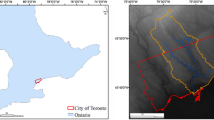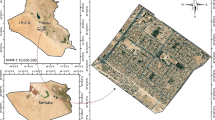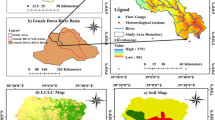Abstract
Context
Modifications to land surface thermal regime by climate change and land cover/land-use change may influence ecosystem structure and function in arid landscapes, but relevant studies are scarce. Large changes in the land surface thermal regime can disturb the hydro-ecological integrity of these landscapes. Thus, it is important to assess landscape change and ecological risk to promote arid landscape sustainability.
Objectives
This study predicted the landscape change and quantified the Bayanbulak ecological risk evolution through a susceptibility-hazard assessment system.
Methods
CA–Markov model was used to simulate the landscape change, while ERA model that builds the susceptibility-hazard indices rapport was applied to evaluate the Bayanbulak wetland ecological risk using 30 m remotely sensed data.
Results
Findings unveiled that modifications in water, meadow, and marshes are predicted to decline at a rate of 39.3, 6.32, 23.98% in 2069 respectively. As wetland hazard, the LST average increased from 20 to 22 °C with a maximum value of 35.2 °C from 1994 to 2019. Likewise, wetland susceptibility mean value increased from 1.10 to 1.20, a growth rate of 9.09%. Though the decline in high-risk zones, moderate risk zones drastically augmented at the extent of 70.5% while low risk and no risk zones declined with a reduction rate of 18.9 and 95.8% respectively. Overall observations exhibited that Bayanbulak ecological risk is slightly evolving.
Conclusion
Bayanbulak is a pool of ecosystem services. By highlighting its ecological risk evolution, we call upon the focus on factors driving LST increment and adopt climatic adaptation measures of aqua-terrestrial ecosystems for Bayanbulak management.













Similar content being viewed by others
References
Ahmad A, Quegan S (2012) Analysis of maximum likelihood classification on multispectral data. Appl Math Sci 6(129):6425–6436
Anderson MC, Norman JM, Mecikalski JR, Otkin JA, Kustas WP (2007) A climatological study of evapotranspiration and moisture stress across the continental United States based on thermal remote sensing: 2. Surface moisture climatology. J Geophys Res 112(D11). https://doi.org/10.1029/2006JD007507
Arabi M, Fassnacht SR, Duffy WG, Ahmadi M, Hegewisch KC, Records RM (2014) Climate change and wetland loss impacts on a western river's water quality. Hydrol Earth Syst Sci 18(11):4509–4527. https://doi.org/10.5194/hess-18-4509-2014
Behere Mukunda D, Borate SN, Panda SN, Behera PR, Roy PS (2012) Modelling and analyzing the watershed dynamics using Cellular Automata (CA)–Markov model–A geo-information based approach. J Earth Syst Sci 121(4):1011–1024. https://doi.org/10.1007/s12040-012-0207-5
Tang B, Li J, Luo J (2009) Review on the ecological risk assessment of wetland. J Anhui Agric Sci 13:6104–6107
Dong C, Guogang Z, Lu J, Hou Y, Qiaolong B, Ang Q (2013) Habitat selection of whooper swan at Bayanbulak in Xinjiang of China. Acta Ecol Sin 33(16):4885–4891
Chejarla VR, Maheshuni PK, Mandla VR (2016) Quantification of LST and CO2 levels using Landsat-8 thermal bands on urban environment. Geocarto Int 31(8):913–926
Chen S, Bin C, Fath BD (2013) Ecological risk assessment on the system scale: a review of state-of-the-art models and future perspectives. Ecol Model 250:25–33
De Lange HJ, Sala S, Vighi M, Faber JH (2010) Ecological vulnerability in risk assessment—a review and perspectives. Sci Total Environ 408(18):3871–3879
Deli A, Di M, Erdaolaiti Y (2018) Study on establishing family pasture and grassland animal husbandry in Bayanbulak grassland in south slopes of Tianshan mountain. Bot Res 7(4):471-479. https://doi.org/10.12677/BR.2018.74057
Ding S, Liang G (2004) Landscape pattern change of regional wetland along the Yellow River in Henan Province in the last two decades. Acta Geogr Sin 5:653–661
Eastman J (2012) IDRISI selva tutorial, manual version 17.0. Clark University, Worsester
Eldridge DJ, Bowker MA, Maestre FT, Roger E, Reynolds JF, Whitford WG (2011) Impacts of shrub encroachment on ecosystem structure and functioning: towards a global synthesis. Ecol lett 14(7):709–722. https://doi.org/10.1111/j.1461-0248.2011.01630.x
Erwin KL (2009) Wetlands and global climate change: the role of wetland restoration in a changing world. Wetl Ecol Manag 17(1): 71. https://doi.org/10.1007/s11273-008-9119-1
Finlayson CM, Davies GT, Moomaw WR, Chmura GL, Natali SM, Perry JE, Roulet N, Sutton-Grier AE (2019) The second warning to humanity–providing a context for wetland management and policy. Wetlands 39(1):1–5. https://doi.org/10.1007/s13157-018-1064-z
Fu J, Liu J, Wang X, Zhang M, Chen W, Chen B (2020) Ecological risk assessment of wetland vegetation under projected climate scenarios in the Sanjiang Plain, China. J Environ Manage 273:111108. https://doi.org/10.1016/j.jenvman.2020.111108
Gao H, Bai J, Xiao R, Liu P, Jiang W, Wang J (2013) Levels, sources and risk assessment of trace elements in wetland soils of a typical shallow freshwater lake, China. Stoch Environ Res Risk Assess 27(1):275–284. https://doi.org/10.1007/s00477-012-0587-8
Gidey E, Dikinya O, Sebego R, Segosebe E, Zenebe A (2017) Cellular automata and Markov Chain (CA_Markov) model-based predictions of future land use and land cover scenarios (2015–2033) in Raya, northern Ethiopia. Model Earth Syst Environ 3(4):1245–1262. https://doi.org/10.1007/s40808-017-0397-6
Gitay H, Finlayson CM, Davidson NC (2011) A Framework for assessing the vulnerability of wetlands to climate change. Ramsar Technical Report No. 5/CBD Technical Series No. 57. Ramsar Convention Secretariat, Gland, Switzerland & Secretariat of the Convention on Biological Diversity, Montreal, Canada. ISBN 92-9225-361-1 (print); 92-9225-362-X (web)
He B, Sheng Y, Cao W, Wu J (2020) Characteristics of climate change in Northern Xinjiang in 1961–2017, China. Chin Geogr Sci 1–17. https://doi.org/10.1007/s11769-020-1104-5
Hereher ME (2016) Time series trends of land surface temperatures in Egypt: a signal for global warming. Environ Earth Sci 75(17):1–11. https://doi.org/10.1007/s12665-016-6024-4
Hong Y (2000) Approaching a close look at the Hejing County of Xinjiang. Xinjiang Art-Photography Press, Urumqi
Hyandye C, Martz LW (2017) A Markovian and cellular automata land-use change predictive model of the Usangu Catchment. Int J Remote Sens 38(1):64–81. https://doi.org/10.1080/01431161.2016.1259675
Jackson RB, Banner JL, Jobbágy EG, Pockman WT, Wall DH (2002) Ecosystem carbon loss with woody plant invasion of grasslands. Nature 418(6898):623–626. https://doi.org/10.1038/nature00910
Jiang P, Cheng L, Li M, Zhao R, Huang Q (2014) Analysis of landscape fragmentation processes and driving forces in wetlands in arid areas: A case study of the middle reaches of the Heihe River, China. Ecol Ind 46:240–252. https://doi.org/10.1016/j.ecolind.2014.06.026
Jiang W, Lv J, Wang C, Chen Z, Liu Y (2017) Marsh wetland degradation risk assessment and change analysis: a case study in the Zoige Plateau, China. Ecol Ind 82:316–326. https://doi.org/10.1016/j.ecolind.2017.06.059
Karnieli A, Agam N, Pinker RT, Anderson M, Imhoff ML, Gutman GG, Panov N, Goldberg A (2010) Use of NDVI and land surface temperature for drought assessment: merits and limitations. J clim 23(3):618–633. https://doi.org/10.1175/2009JCLI2900.1
Kellett BM, Walshe TV, Bristow KL (2005) Ecological risk assessment for the wetlands of the lower Burdekin. CSIRO Land and Water.
Kingston DG, Todd MC, Taylor RG, Thompson JR, Arnell NW (2009) Uncertainty in the estimation of potential evapotranspiration under climate change. Geophys Res Lett 36(20). https://doi.org/10.1029/2009GL040267
Li Y, Zhao M, Motesharrei S, Mu Q, Kalnay E, Li S (2013) Local cooling and warming effects of forests based on satellite observations. Nat Commun 6:6603. https://doi.org/10.1038/ncomms7603
Li Z, Chen Y, Li W, Deng H, Fang G (2015) Potential impacts of climate change on vegetation dynamics in Central Asia. J Geophys Res 120(24):12345–12356
Li ZL, Wu H, Wang N, Qiu S, Sobrino JA, Wan Z, Hui Tang Bo, Yan G (2013) Land surface emissivity retrieval from satellite data. Int J Remote Sens 34(9–10):3084–3127. https://doi.org/10.1080/01431161.2012.716540
Liu W, Kogan F (1996) Monitoring regional drought using the vegetation condition index. Int J Remote Sens 17(14):2761–2782. https://doi.org/10.1080/01431169608949106
Liu YY, Hu YK, Yu JM, Wang X, Li KH (2011) Pedicularis verticillata communitys characteristics along water gradient on alpine grassland. Bull Soil Water Conserv 31:52–56
Lu A, Ding Y, Pang H, Yuan L, Yuanqing H (2005) Impact of global warming on water resource in arid area of northwest China. J Mt Sci 2(4):313–318. https://doi.org/10.1007/BF02918404
Luo F, Liu Y, Peng J, Wu J (2018) Assessing urban landscape ecological risk through an adaptive cycle framework. Landsc Urban Plan 180:125–134. https://doi.org/10.1016/j.landurbplan.2018.08.014
Luo G, Feng Y, Zhang B, Cheng W (2010) Sustainable land-use patterns for arid lands: a case study in the northern slope areas of the Tianshan Mountains. J Geog Sci 20(4):510–524. https://doi.org/10.1007/s11442-010-0510-5
Luo M, Liu T, Meng F, Duan Y, Bao A, Xing W, Xian Wei, De Maeyer P, Frankl A (2019) Identifying climate change impacts on water resources in Xinjiang, China. Sci Total Environ 676:613–626. https://doi.org/10.1016/j.scitotenv.2019.04.297
Ma DT, Guo YX, Hou FJ, Zhai XY, Wang W, Tian M, Wang ZW, Yan XB (2014) Plant genetic diversity and grazing management on the Qinghai-Tibetan Plateau: A case study of a dominant native wheatgrass (Elymus nutans). Biochem Syst Ecol 56:16–23. https://doi.org/10.1016/j.bse.2014.04.014
McCauley LA, Anteau MJ, van der Burg MP, Wiltermuth MT (2015) Land use and wetland drainage affect water levels and dynamics of remaining wetlands. Ecosphere 6(6):1–22. https://doi.org/10.1890/ES14-00494.1
McInnes R, Ali M, Pritchard D (2017) Ramsar and World heritage Conventions: Converging towards success. In Ramsar: Ramsar Convention Secretariat
Memarian H, Balasundram SK, Talib JB, Sung CTB, Sood AM, Abbaspour K (2012) Validation of CA-Markov for simulation of land use and cover change in the Langat Basin, Malaysia. Sci Res 4(6):542–554. https://doi.org/10.4236/jgis.2012.46059
Meng L, Roulet N, Zhuang Q, Christensen TR, Frolking S (2016) Focus on the impact of climate change on wetland ecosystems and carbon dynamics. Environ Res Lett 11(10):100201
Mindje M, Tumushimire L, Sinsch U (2020) Diversity assessment of anurans in the Mugesera wetland (eastern Rwanda): impact of habitat disturbance and partial recovery. Salamandra 56:27–38
Mitsch WJ, Gosselink JG (2000) The value of wetlands: importance of scale and landscape setting. Ecol Econ 35(1):25–33. https://doi.org/10.1016/S0921-8009(00)00165-8
NASA (2017) Landsat 7 science data users handbook. National Aeronautics and Space Administration, Washington, DC
Nemani R, Pierce L, Running S, Goward S (1993) Developing satellite-derived estimates of surface moisture status. J Appl Meteorol climatol 32(3):548–557. https://doi.org/10.1175/1520-0450(1993)032<0548:DSDEOS>2.0.CO;2
Nyandwi E, Veldkamp T, Amer S (2016) Regional climate sensitivity of wetland environments in Rwanda: the need for a location-specific approach. Reg Environ Change 16(6):1635–1647. https://doi.org/10.1007/s10113-015-0905-z
Onilude O, Vaz E (2020) Data analysis of land use change and urban and rural impacts in Lagos state, Nigeria. Data 5(3):72. https://doi.org/10.3390/data5030072
Pang Z, Huang T, Chen Y (2010) Diminished groundwater recharge and circulation relative to degrading riparian vegetation in the middle Tarim River, Xinjiang Uygur. Western China. Hydrol Process 24(2):147–159. https://doi.org/10.1002/hyp.7438
Parastatidis D, Mitraka Z, Chrysoulakis N, Abrams M (2017) Online global land surface temperature estimation from Landsat. Remote Sens 9(12):1208. https://doi.org/10.3390/rs9121208
Patel AK, Lodha D, Shekhawat NS (2020) An improved micropropagation protocol for the ex situ conservation of Mitragyna parvifolia (Roxb.) Korth. (Rubiaceae): an endangered tree of pharmaceutical importance. Vitro Cell Dev Biol Plant 56(6):817–826. https://doi.org/10.1007/s11627-020-10089-6
Paustenbach DJ (2015) Human and ecological risk assessment theory and practice. Wiley, New York
Pueyo Y, Alados CL, Ferrer-Benimeli C (2006) Is the analysis of plant community structure better than common species-diversity indices for assessing the effects of livestock grazing on a Mediterranean arid ecosystem? J Arid Environ 64(4):698–712. https://doi.org/10.1016/j.jaridenv.2005.06.016
Qian L-X, Cui H-S (2008) Relationship between normalized difference moisture index and land surface temperature. Geogr Res 6:1358-1367
Qin Z, Karnieli A (1999) Progress in the remote sensing of land surface temperature and ground emissivity using NOAA-AVHRR data. Int J Remote Sens 20(12):2367–2393. https://doi.org/10.1080/014311699212074
Ring MJ, Lindner D, Cross EF, Schlesinger ME (2012) Causes of the global warming observed since the 19th century. Atmos Clim Sci 2(4):401. https://doi.org/10.4236/acs.2012.24035
Rozenstein O, Qin Z, Derimian Y, Karnieli A (2014) Derivation of land surface temperature for Landsat-8 TIRS using a split window algorithm. Sensors 14(4):5768–5780. https://doi.org/10.3390/s140405768
Saaty TL (1980) The analytic hierarchy process. Mcgraw Hill, New York. Agricultural Economics Review, 70
Shaver GR, Canadell J, Chapin FS, Gurevitch J, Harte J, Henry G, Ineson P, Jonasson S, Melillo J, Pitelka Louis, Rustad L (2000) Global warming and terrestrial ecosystems: a conceptual framework for analysis: ecosystem responses to global warming will be complex and varied. Ecosystem warming experiments hold great potential for providing insights on ways terrestrial ecosystems will respond to upcoming decades of climate change. Documentation of initial conditions provides the context for understanding and predicting ecosystem responses. Bioscience 50(10):871–882. https://doi.org/10.1641/0006-3568(2000)050[0871:GWATEA]2.0.CO;2
Shi H, Yang Z, Han F, Shi T, Li D (2015) Assessing Landscape Ecological Risk for a World Natural Heritage Site: a Case Study of Bayanbulak in China. Polish J Environ Stud 24(1):269–283 https://doi.org/10.15244/pjoes/28685
Singh SK, Mustak S, Srivastava PK, Szabó S, Islam T (2015) Predicting spatial and decadal LULC changes through cellular automata Markov chain models using earth observation datasets and geo-information. Environ Proc 2(1):61–78. https://doi.org/10.1007/s40710-015-0062-x
Sobrino JA, Jiménez-Muñoz JC, Paolini L (2004) Land surface temperature retrieval from LANDSAT TM 5. Remote Sensing of environment 90(4):434–440. https://doi.org/10.1016/j.rse.2004.02.003
Song L, Liu S, Kustas WP, Zhou J, Xu Z, Xia T, Li M (2016) Application of remote sensing-based two-source energy balance model for mapping field surface fluxes with composite and component surface temperatures. Agric For Meteorol 230:8–19. https://doi.org/10.1016/j.agrformet.2016.01.005
Strahler AH (1980) The use of prior probabilities in maximum likelihood classification of remotely sensed data. Remote Sens Environ 10(2):135–163. https://doi.org/10.1016/0034-4257(80)90011-5
Suter GW II (2016) Ecological risk assessment. CRC Press, Boca Raton
Swain S, Wardlow BD, Narumalani S, Tadesse T, Callahan K (2011) Assessment of vegetation response to drought in Nebraska using Terra-MODIS land surface temperature and normalized difference vegetation index. GISci Remote Sens 48(3):432–455. https://doi.org/10.2747/1548-1603.48.3.432
Tilahun A, Teferie B (2015) Accuracy assessment of land use land cover classification using Google Earth. Am J Environ Protect 4(4):193–198. https://doi.org/10.11648/j.ajep.20150404.14
USGS (2015) What are the band designations for the Landsat satellites. In: USGS science for changing world. USGS, Reston
US Environmental Protection Agency (1998) Guidelines for ecological risk assessment. Risk Assessment Forum, US Environmental Protection Agency
Uuemaa E, Antrop M, Roosaare J, Marja R, Mander Ü (2009) Landscape metrics and indices: an overview of their use in landscape research. Living Rev Landsc Res 3(1):1–28 http://hdl.handle.net/1854/LU-695518
Wang SQ, Zheng XQ, Zang XB (2012) Accuracy assessments of land use change simulation based on Markov-cellular automata model. Procedia Environ Sci 13:1238–1245. https://doi.org/10.1016/j.proenv.2012.01.117
Wang Z, Yang Z, Shi H, Han F, Liu Q, Qi J, Lu Y (2020) Ecosystem health assessment of World natural heritage sites based on remote sensing and field sampling verification: Bayanbulak as case study. Sustainability 12(7):2610. https://doi.org/10.3390/su12072610
Xiao DR, Tian B, Tian K, Yang Y (2010) Landscape patterns and their changes in Sichuan Ruoergai wetland national nature reserve. Acta Ecol Sin 30(1):27–32. https://doi.org/10.1016/j.chnaes.2009.12.005
Xiaobo L, Deli W (1996) The Effect of grazing on the plant diversity of aneurolepidium chinense grassland in Jilin Province. J Northeast Normal Univ 2:02
Xu J, Wang C, Li W, Zuo J (2018) Multi-temporal scale modeling on climatic-hydrological processes in data-scarce mountain basins of Northwest China. Arab J Geosci 11:423. https://doi.org/10.1007/s12517-018-3784-z
Xu L, Liu H, Chu X, Su K (2006) Desert vegetation patterns at the northern foot of Tianshan Mountains: the role of soil conditions. Flora Morphol Distrib Funct Ecol Plants 201(1):44–50. https://doi.org/10.1016/j.flora.2005.04.003
Yang Q, Cui CX (2005) Impact of climate change on the surface water in Bayanbuluk Alpine-cold wetland in the Tianshan mountainous. J Glaciol Geocryol 27(3):397–403
Yang Z, Mao X (2011) Wetland system network analysis for environmental flow allocations in the Baiyangdian Basin China. Ecol Model 222(20–22):3785–3794. https://doi.org/10.1016/j.ecolmodel.2011.09.013
Yao J, Zhao Y, Yu X (2018) Spatial-temporal variation and impacts of drought in Xinjiang (Northwest China) during 1961–2015. Peer J 6:e4926. https://doi.org/10.7717/peerj.4926
Yao J, Hu W, Chen Y, Huo W, Zhao Y, Mao W, Yang Q (2019) Hydro-climatic changes and their impacts on vegetation in Xinjiang, Central Asia. Sci Total Environ 660:724–732. https://doi.org/10.1016/j.scitotenv.2019.01.084
Ye BS, Ding YJ, Liu CH (2001) Response of valley glaciers in various sizes and their runoff to climate change. J Glaciol Geocryol 23(2):103–110
Ye HX, Zang SY, Zhang LJ, Zhang YH (2013) Distribution and potential ecological risk assessment of heavy metals in sediments of zhalong wetland. Environ Sci 34(4):1333–1339
Yin W, Hu YK, Liu YY, Gong YM, Zhang W, Liu W (2010) A study on soil biological properties of artificial grassland over different cultivation times in Bayanbulak. Acta Pratacul Sin 19(5):218
Yu X, Guo X, Wu Z (2014) Land surface temperature retrieval from Landsat 8 TIRS—Comparison between radiative transfer equation-based method, split window algorithm and single channel method. Remote Sens 6(10):9829–9852. https://doi.org/10.3390/rs6109829
Zaiyi F, Xuegong X, Huiping L, Xianli W (2001) Regional ecological risk assessment of in the Liaohe River Delta wetlands. Acta Ecol Sin 21(3):365–373
Zhang BP, Yao YH, Cheng WM, Zhou C, Lu Z, Chen X, Alshir K, ErDowlet I, Shi Q (2002) Human-induced changes to biodiversity and alpine pastureland in the bayanbulak region of the east tienshan mountains. Mt Res Dev 22(4):383–389. https://doi.org/10.1659/0276-4741(2002)022[0383:HICTBA]2.0.CO;2
Zhang R, Zhao C, Ma X, Brindha K, Han Q, Li C, Zhao X (2019) Projected spatiotemporal dynamics of drought under global warming in Central Asia. Sustainability 11(16):4421. https://doi.org/10.3390/su11164421
Acknowledgements
The research is supported by the National Natural Science Foundation of China (U1903208, 41630859). As well, the authors express their gratitude for the support from Xinjiang Institute of Ecology and Geography, Chinese Academy of Sciences (CAS).
Author information
Authors and Affiliations
Corresponding author
Ethics declarations
Conflict of interest
The authors declare no conflict of interest.
Additional information
Publisher's Note
Springer Nature remains neutral with regard to jurisdictional claims in published maps and institutional affiliations.
Supplementary Information
Below is the link to the electronic supplementary material.
Rights and permissions
About this article
Cite this article
Kayumba, P.M., Chen, Y., Mind’je, R. et al. Geospatial land surface-based thermal scenarios for wetland ecological risk assessment and its landscape dynamics simulation in Bayanbulak Wetland, Northwestern China. Landscape Ecol 36, 1699–1723 (2021). https://doi.org/10.1007/s10980-021-01240-8
Received:
Accepted:
Published:
Issue Date:
DOI: https://doi.org/10.1007/s10980-021-01240-8




